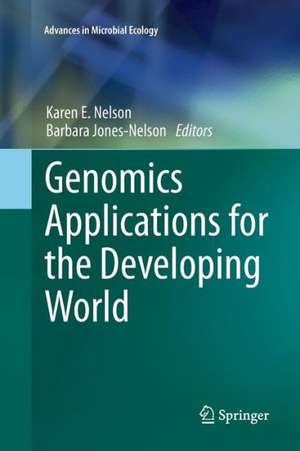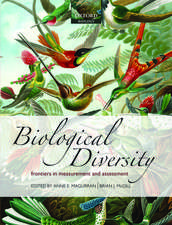Genomics Applications for the Developing World: Advances in Microbial Ecology
Editat de Karen E. Nelson, Barbara Jones-Nelsonen Limba Engleză Paperback – 11 iun 2014
| Toate formatele și edițiile | Preț | Express |
|---|---|---|
| Paperback (1) | 948.29 lei 6-8 săpt. | |
| Springer – 11 iun 2014 | 948.29 lei 6-8 săpt. | |
| Hardback (1) | 952.89 lei 6-8 săpt. | |
| Springer – 11 mai 2012 | 952.89 lei 6-8 săpt. |
Preț: 948.29 lei
Preț vechi: 1156.45 lei
-18% Nou
Puncte Express: 1422
Preț estimativ în valută:
181.45€ • 190.47$ • 150.61£
181.45€ • 190.47$ • 150.61£
Carte tipărită la comandă
Livrare economică 10-24 aprilie
Preluare comenzi: 021 569.72.76
Specificații
ISBN-13: 9781493901180
ISBN-10: 1493901184
Pagini: 376
Ilustrații: XII, 364 p.
Dimensiuni: 155 x 235 x 20 mm
Greutate: 0.53 kg
Ediția:2012
Editura: Springer
Colecția Springer
Seria Advances in Microbial Ecology
Locul publicării:New York, NY, United States
ISBN-10: 1493901184
Pagini: 376
Ilustrații: XII, 364 p.
Dimensiuni: 155 x 235 x 20 mm
Greutate: 0.53 kg
Ediția:2012
Editura: Springer
Colecția Springer
Seria Advances in Microbial Ecology
Locul publicării:New York, NY, United States
Public țintă
GraduateCuprins
Part I: Introduction.- Chapter 1. Genomics and the Developing World.- Chapter 2. Application of Genetic and Genomic Tests in the Developing World.- Part II:Microbial Pathogen Genomes.- Chapter 3. The Genomics of Cholera.- Chapter 4. The Genomics of Leprosy.- Chapter 5. Pathogen genomics and the potential for understanding diseases in the developing world.- Chapter 6. New Tuberculosis Drugs.- Part III: Viruses.- Chapter 7. Viral genomics: implications for the understanding and control of emerging viral diseases.- Part IV:Eukaryotic Disease.- Chapter 8. Malaria Genomics and the Developing World.- Chapter 9. Delivering on promises? The Impact of Kinetoplastid Genomics on Sleeping Sickness, Chagas Disease and Leishmaniasis.- Part V:Pharmacogenomics.- Chapter 10. Pharmacogenomic Applications in the Developing World - The American Continent.- Chapter 11. Pharmacogenomics in Africa: Diversity as an opportunity for personalized healthcare.- Chapter 12. Pharmacogenomics in Developing Asian Countries.- Part VI:New Frontiers.- Chapter 13. Microbial diversity of the Brazilian biomes (Atlantic Forest, Amazon ‘Rain’ Forest, Cerrado, and the Marine realm).- Chapter 14. Genetic Diversity of Microbial Endophytes and Their Biotechnical Applications.- Chapter 15. Genomics and potential Bioenergy Applications In the Developing World.- Chapter 16. Molecules with the potential for cancer therapy in the developing world: Dibenzyl Trisulfide(DTS).- Chapter 17. The effect of diet on gut microbiota in humans living in different environments: a metagenomic approach.- Part VII: Plant Genomes.-Chapter 18. Analyzing the Papaya Genome.- Part VIII: Education.- Chapter 19. The global challenge of genomics education: A path to the future.- Chapter 20. Genomics and potential downstream applications in the Developing World.
Textul de pe ultima copertă
Genomics Applications for the Developing World evolved from an observed need for information on genomics and other related “omics’ technologies that are beginning to take hold in the developing world. It presents current research and perspectives from a wide range of respected scientists and world leaders in their fields in both developed and developing countries. Topics range from discussions on Tuberculosis, Malaria, emerging viruses and bacterial infectious agents to discussions on genomics of various crop species and the implications of studies on the human microbiome to aspects of developing world health. The global challenge of genomics education is also discussed.
This book is a reference work for scientists at all levels, educators and students both at the graduate and undergraduate level who reside across the globe.
This book is a reference work for scientists at all levels, educators and students both at the graduate and undergraduate level who reside across the globe.
Caracteristici
This series of short monographs captures information on relevant topics and discusses how genomics can be applied to improve on existing conditions Aims to collate views from leaders in the field who are primarily based in the developing world Targeted towards genomics applications of developing world problems





















